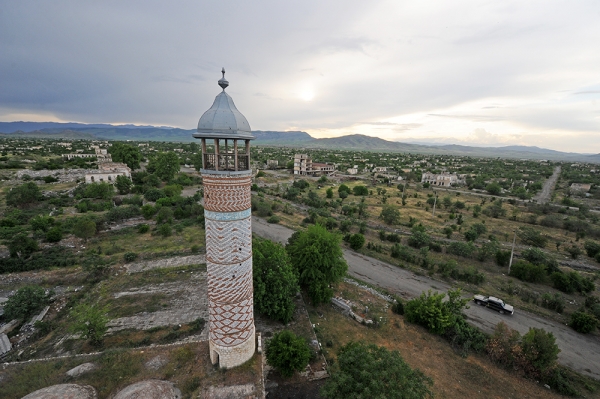New steps in Nagorno-Karabakh conflict settlement raise hopes for peace

By Sara Rajabova
After an extended delay in the settlement of the Armenian-Azerbaijani Nagorno-Karabakh conflict and Armenia’s provocations on the contact line, a small but nonetheless positive development has been observed in the negotiation process.
The discussion of possible means to solve the long-standing conflict in Washington and Moscow between the OSCE Minsk Group co-chairs and the high-ranking U.S. and Russian officials have paved the way for future progress in the settlement of the problem.
Furthermore, statements by the senior officials of the leading countries calling for parties to intensify efforts to settle the conflict peacefully increase hopes for putting an end to a problem that is source of instability and a threat to peace and security in the South Caucasus region.
A while ago, Russian Foreign Minister Sergey Lavrov said at a meeting with his Azerbaijani counterpart Elmar Mammadyarov that it was time to intensify the negotiations on settlement of the Nagorno-Karabakh conflict.
Washington’s role in the recent developments regarding the negotiation process on resolution of the lingering conflict is more visible.
James Warlick, the U.S. co-chair of the OSCE Minsk Group has invited the Russian and French co-chairs to Washington to engage in high-level meetings with officials from the State Department, the Pentagon, and the intelligence community.
Political Analyst Mubariz Ahmadoglu, the director of the Center for Political Innovations and Technology, said this is the first such event since the creation of the institute of co-chairmanship. Warlick’s aim was to familiarize the co-chairs with the U.S. position on the Nagorno-Karabakh settlement.
He noted that this qualitative change created by Warlick could soon pave the way for further changes.
Referring to the meetings of the co-chairs in Washington and Moscow, as well as the recent visit to region, Ahmadoglu stressed that such proactivity by the co-chairs in such a short period of time was observed for the first time, in the meantime adding that not only activity, but also a change in content is apparent.
In an interview with the newspaper ‘Vedomosti’ in Moscow, Warlick said the "occupied lands should be returned to Azerbaijan." He also repeated this call during his visit to Yerevan.
“In any case, the activeness of Warlick is U.S. government’s policy. The changing position of the U.S. government on the Nagorno-Karabakh conflict also received support from other structures of the West,” Ahmadoglu said.
The interest of world powers on a quick resolution to the conflict could promise progress and pave the way for a speedy settlement of problem in the near future.
The recent nuclear deal between the P5+1 and Iran that ended a decade-old nuclear dispute could prove to be an example in this regard.
However, Armenia’s continuing unconstructive position in the negotiations and provocative moves to prolong the settlement of the problem cast a shadow on hopes for a speedy resolution of the conflict.
Ahmadoglu said Armenia is not ready for peace, noting however, that it cannot declare its unwillingness to participate in the talks.
“That is why Armenia has declared that it supports package settlement option: first, it is needed to agree on all the issues and then solve them. Despite the fact that Armenia now goes to various manipulations, it is not far removed from its original opinion,” Ahmadoglu said.
He noted that the principle of "If one issue is not agreed, then all issues are not agreed" favors the Armenians, adding that the principle of consensus in the Minsk Group has turned into a kind of lifeline for the Armenians.
Ahmadoglu further stated that despite the fact that the package and phased versions of the Nagorno-Karabakh conflict settlement have been forgotten over time, they were widely used.
He went on to say that Azerbaijan agrees on a phased settlement of the conflict, being that the Armenians are not going to solve the Karabakh conflict anytime soon. “Therefore, Azerbaijan considers acceptable the division and resolution of the Nagorno-Karabakh problem phase by phase.”
The expert further noted what is happening at the present stage of the Nagorno-Karabakh conflict settlement uses elements from both options, but this time by the co-chairing countries.
“The statements of the Russian side are very close to the phased solution, while the statements voiced by the United States coincide with the package option of settlement of the Nagorno-Karabakh conflict,” Ahmadoglu said.
The Nagorno-Karabakh conflict emerged in 1988 when Armenia made territorial claims against Azerbaijan. A lengthy war in the early 1990s resulted in the displacement of over one million Azerbaijanis from native and historical hands and the occupation of over 20 percent of Azerbaijan's internationally recognized territory –including Nagorno-Karabakh and seven adjacent regions – by the Armenian armed forces
Peace talks, mediated by Russia, France and the U.S. through the OSCE Minsk Group, are underway on the basis of a peace outline proposed by the Minsk Group co-chairs dubbed the Madrid Principles. However, the negotiations have been largely fruitless so far.
In addition, Armenia has been ignoring the UN Security Council's four resolutions on the withdrawal of its troops from the occupied territories over the past 20 years.
--
Sara Rajabova is AzerNews’ staff journalist, follow her on
Twitter: @SaraRajabova
Follow us on Twitter @AzerNewsAz
